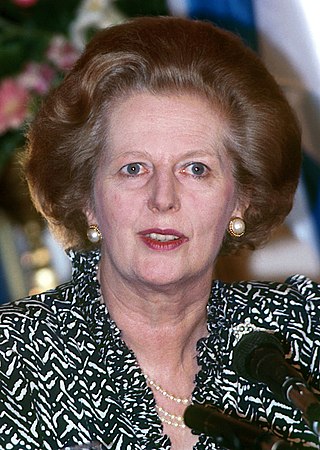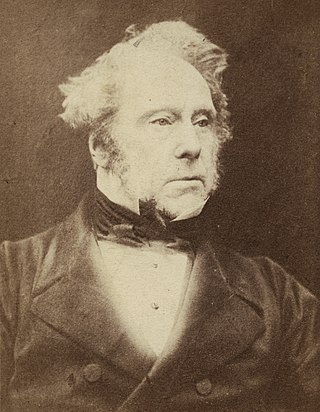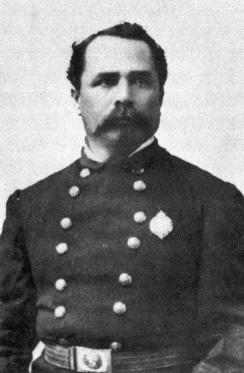Related Research Articles

Benjamin Disraeli, 1st Earl of Beaconsfield, was a British statesman, Conservative politician, and writer who twice served as Prime Minister of the United Kingdom. He played a central role in the creation of the modern Conservative Party, defining its policies and its broad outreach. Disraeli is remembered for his influential voice in world affairs, his political battles with the Liberal Party leader William Ewart Gladstone, and his one-nation conservatism or "Tory democracy". He made the Conservatives the party most identified with the British Empire and military action to expand it, both of which were popular among British voters. He is the only British prime minister to have been of Jewish origin. He was also a novelist, publishing works of fiction even as prime minister.

The Liberal Party was one of the two major political parties in the United Kingdom, along with the Conservative Party, in the 19th and early 20th centuries. Beginning as an alliance of Whigs, free trade–supporting Peelites and reformist Radicals in the 1850s, by the end of the 19th century, it had formed four governments under William Gladstone. Despite being divided over the issue of Irish Home Rule, the party returned to government in 1905 and won a landslide victory in the 1906 general election.
The Conservative Party, officially the Conservative and Unionist Party and also known colloquially as the Tories, is one of the two main political parties in the United Kingdom, along with the Labour Party. It is the current governing party, having won the 2019 general election, and has been the primary governing party in the United Kingdom since 2010. The party is on the centre-right of the political spectrum, and encompasses various ideological factions including one-nation conservatives, Thatcherites, and traditionalist conservatives. The party currently has 354 Members of Parliament, 260 members of the House of Lords, 9 members of the London Assembly, 31 members of the Scottish Parliament, 16 members of the Welsh Parliament, 4 directly elected mayors, 30 police and crime commissioners, and around 5,647 local councillors. It holds the annual Conservative Party Conference.

The 1983 United Kingdom general election was held on Thursday 9 June 1983. It gave the Conservative Party under the leadership of Margaret Thatcher the most decisive election victory since that of the Labour Party in 1945, with a majority of 144 seats and the first of two consecutive landslide victories.

Thatcherism is a form of British conservative ideology named after Conservative Party leader Margaret Thatcher that relates to not just her political platform and particular policies but also her personal character and style of management while in office. Proponents of Thatcherism are referred to as Thatcherites. The term has been used to describe the principles of the British government under Thatcher from the 1979 general election to her resignation in 1990, but it also receives use in describing administrative efforts continuing into the Conservative governments under John Major and David Cameron throughout the 1990s and 2010s. In international terms, Thatcherites have been described as a part of the general socio-economic movement known as neoliberalism, with different countries besides the United Kingdom sharing similar policies around expansionary capitalism.
The Liberal Unionist Party was a British political party that was formed in 1886 by a faction that broke away from the Liberal Party. Led by Lord Hartington and Joseph Chamberlain, the party established a political alliance with the Conservative Party in opposition to Irish Home Rule. The two parties formed the ten-year-long coalition Unionist Government 1895–1905 but kept separate political funds and their own party organisations until a complete merger between the Liberal Unionist and the Conservative parties was agreed to in May 1912.

The 1987 United Kingdom general election was held on Thursday, 11 June 1987, to elect 650 members to the House of Commons. The election was the third consecutive general election victory for the Conservative Party, and second landslide under the leadership of Margaret Thatcher, who became the first Prime Minister since the Earl of Liverpool in 1820 to lead a party into three successive electoral victories.

The 1993 Canadian federal election was held on October 25, 1993, to elect members to the House of Commons of the 35th Parliament of Canada. Considered to be a major political realignment, it was one of the most eventful elections in Canada's history. Two new regionalist parties emerged and the election marked the worst defeat for a governing party at the federal level. In a landslide, the Liberal Party, led by Jean Chrétien, won a majority government.

In the 1859 United Kingdom general election returned no party to a majority of seats in the House of Commons. The Earl of Derby's Conservatives formed a minority government, but despite making overall gains, Derby's government was defeated in a confidence vote by an alliance of Palmerston's Whigs together with Peelites, Radicals and the Irish Brigade. Palmerston subsequently formed a new government from this alliance which is now considered to be the first Liberal Party administration.

Robert William Kalanihiapo Wilcox, nicknamed the Iron Duke of Hawaiʻi, was a Native Hawaiian whose father was an American and whose mother was Hawaiian. A revolutionary soldier and politician, he led uprisings against both the government of the Hawaiian Kingdom under King Kalākaua and the Republic of Hawaii under Sanford Dole, what are now known as the Wilcox rebellions. He was later elected the first delegate to the United States Congress for the Territory of Hawaii.
In the United Kingdom, the word liberalism can have any of several meanings. Scholars primarily use the term to refer to classical liberalism. The term can also mean economic liberalism, social liberalism or political liberalism. It can simply refer to the politics of the Liberal Democrats, a UK party formed from the merger of two centrist parties in 1988. Liberalism can occasionally have the imported American meaning; however, the derogatory connotation is much weaker in the UK than in the US, and social liberals from both the left and right wing continue to use liberal and illiberal to describe themselves and their opponents, respectively.

The Conservative Party is the oldest political party in the United Kingdom and arguably the world. The current party was first organised in the 1830s and the name "Conservative" was officially adopted, but the party is still often referred to as the Tory party. The Tories had been a coalition that more often than not formed the government from 1760 until the Reform Act 1832. Modernising reformers said the traditionalistic party of "Throne, Altar and Cottage" was obsolete, but in the face of an expanding electorate 1830s–1860s it held its strength among royalists, devout Anglicans and landlords and their tenants.

Constance Miriam Purdue was a New Zealand trade unionist. Formerly a communist and a Labour Party member, she later became a conservative Catholic and an anti-abortion activist.
In 1892, the Hawaiian National Liberal Party, also known as the National Liberal Party of the Hawaiian Kingdom, was a political party of the Kingdom of Hawaii near its end.
Beatrice Nancy Seear, Baroness Seear was a British social scientist and politician. She was leader of the Liberal Party in the House of Lords from 1984 to 1988, and Deputy Leader of the Liberal Democrats in the House of Lords from 1988 to 1997. She was also appointed a Privy Councillor in 1985.

Charles Burnett "C.B." Wilson was a British and Tahitian superintendent of the water works, fire chief under King Kalākaua, and Marshal of the Kingdom under Queen Liliʻuokalani. Wilson was also the father of John H. Wilson.

John Edward Bush, also known as John Edwin Bush, was a politician and newspaper publisher in the Kingdom of Hawaii.

The Social Democratic Party (SDP) was a centrist to centre-left political party in the United Kingdom. The party supported a mixed economy, electoral reform, European integration and a decentralised state while rejecting the possibility of trade unions being overly influential within the industrial sphere. The SDP officially advocated social democracy, but its actual propensity is evaluated as close to social liberalism.

William Pūnohuʻāweoweoʻulaokalani White was a Hawaiian lawyer, sheriff, politician, and newspaper editor. He became a political statesman and orator during the final years of the Kingdom of Hawaii and the beginnings of the Territory of Hawaii. Despite being a leading Native Hawaiian politician in this era, his legacy has been largely forgotten or portrayed in a negative light, mainly because of a reliance on English-language sources to write Hawaiian history. He was known by the nickname of "Pila Aila" or "Bila Aila" for his oratory skills.

The 1892 Session of the Legislature of the Hawaiian Kingdom, also known as the Longest Legislature, was a period from May 28, 1892, to January 14, 1893, in which the legislative assembly of the Hawaiian Kingdom met for its traditional bi-annual session. This bicameral body was composed of the upper House of Nobles and the lower House of Representatives. This would be the first session during the reign of Queen Liliʻuokalani and the last meeting of the legislative assembly during the Hawaiian monarchy. Three days after the prorogation of the assembly, many of the political tension developed during the legislative debates and the queen's attempt to promulgate a new constitution while her legislators were not in session led to the overthrow of the Hawaiian Kingdom on January 17, 1893.
References
- ↑ Ernest Andrade, Unconquerable Rebel, p69
- ↑ Ralph Simpson Kuykendall (1967). Hawaiian Kingdom 1874-1893, the Kalakaua Dynasty. Vol. 3. University of Hawaii Press. p. 517. ISBN 978-0-87022-433-1.
